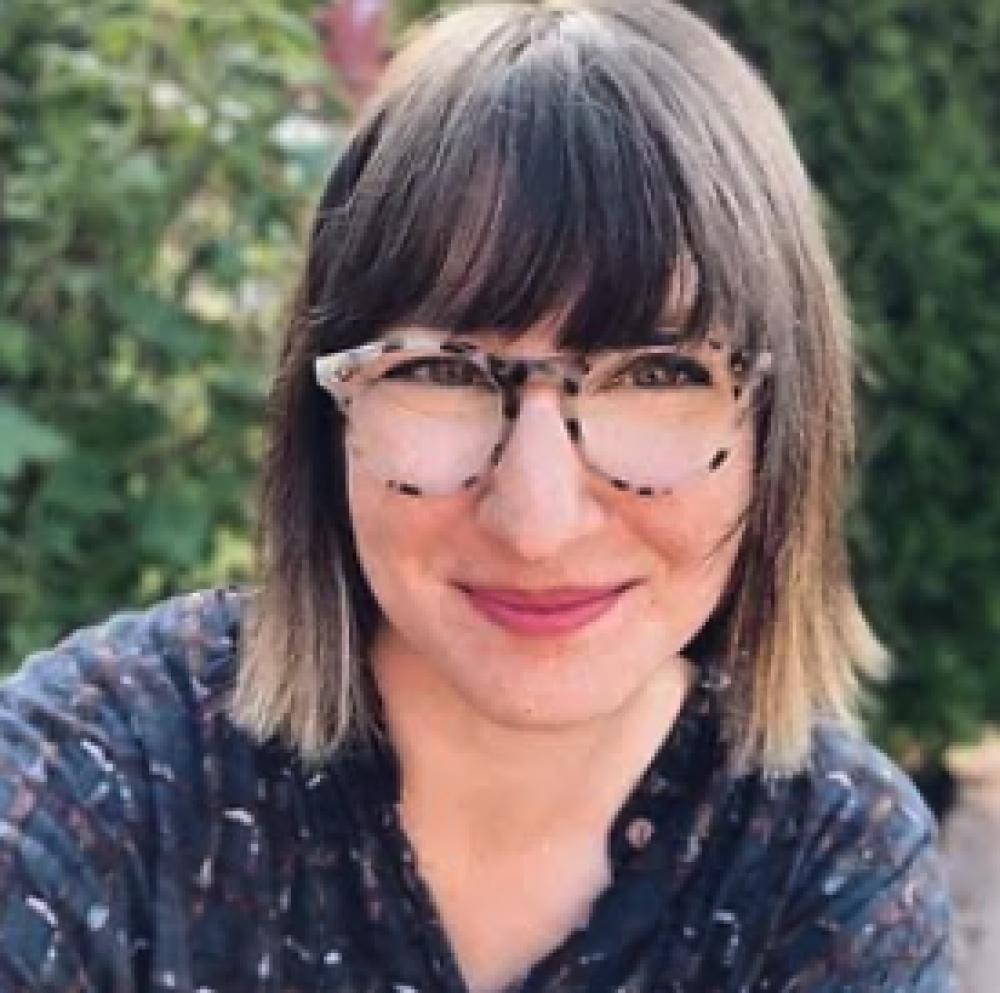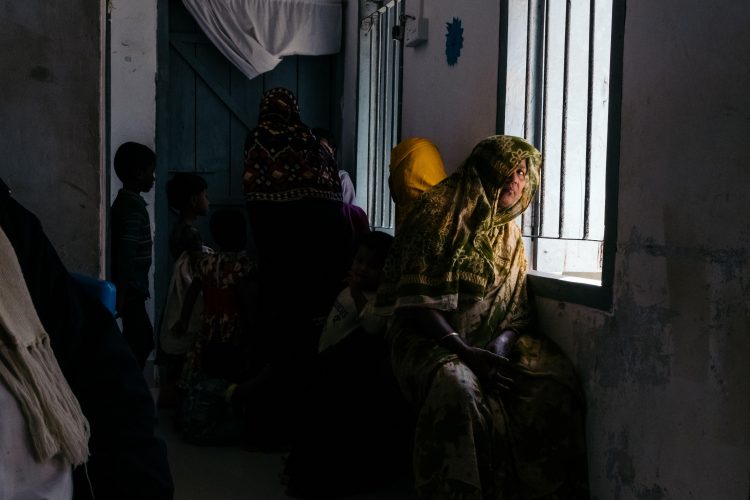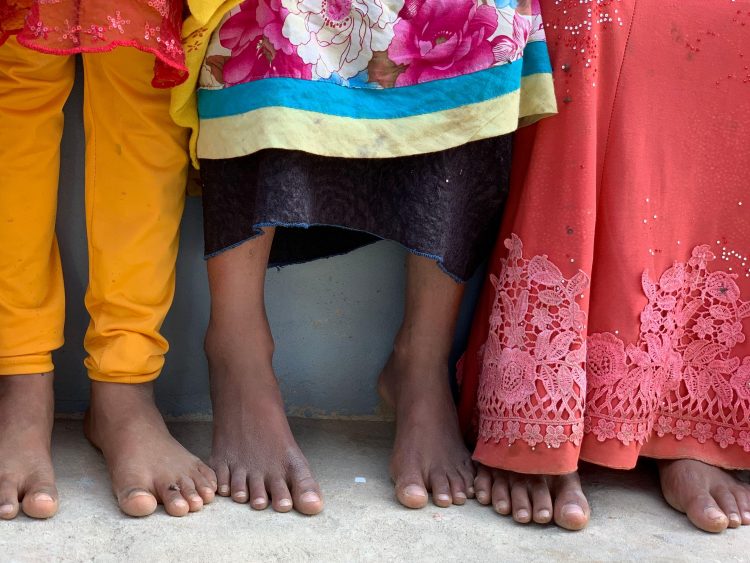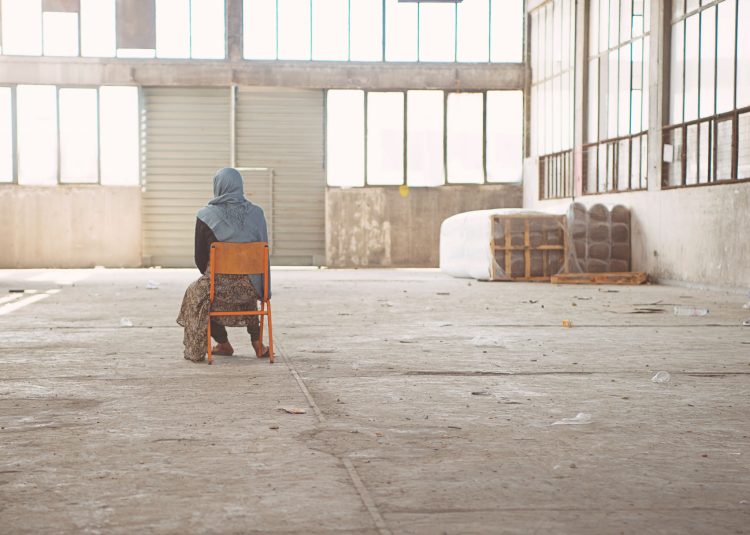
During a series of interviews with forcibly displaced people, and in discussions with other like-minded NGOs, Their Story is Out Story (TSOS) recognized significant gaps in designing and providing trauma-informed therapy for individuals who have experienced displacement. These gaps were further reinforced by legislation and policies that did not appropriately address the mental health needs of resettled populations. To address these gaps, in 2021 and 2022 TSOS interviewed four mental healthcare professionals who each work in a different field of mental healthcare, and as such provided a broad picture of the challenges, opportunities, and lessons learned.
The following interview discusses the challenges and concerns specific to the work Amanda has done for and with displaced people in Cairo, Egypt.
Amanda Voelker
Mrs. Voelker has Bachelor’s degree from St. John’s College Annapolis and a Master’s Degree in Marriage and Family Therapy from Touro University in California. She has experience working with adolescents, families of adolescents, couples, and adults, and specializes in attachment trauma therapy.
Along with working at nine psychology, Amanda is the Team Leader of the Psychosocial and Mental Health Department of Refuge Egypt, where she develops trauma focused mental health interventions for the refugee community.
Tell us your name and where you come from, and a little bit about your background. What made you be where you are today? Why work as a therapist or counselor, in the community with refugees in Cairo, out of all of the things you could have been doing in the world? What drives you?
I'm originally from the US. I grew up on the west coast in California. And I went to school on the east coast at St. John's College. My husband was with the Navy for about eight years and was a submarine officer. So we moved around. And during that time, we lived in Italy for a few years. This was a couple of years after Libya fell. And so we had quite a few refugees from Libya. Nigerians were our most dominant group, people who'd been working in Libya who had fled when Libya fell, and then had the misfortune of not ending up where they were hoping. They thought they'd maybe end up back in Tunis, or Algiers and be able to make it back to Nigeria. They ended up of course in Italy, which is a very unfriendly country to refugees. It’s such a challenging place for someone to end up. And so I got to know several good people there who have become my good friends now. And just seeing the challenges that came up, just for basic protection, like they could work for someone for a month and not get paid and there was no recourse from the government. There was no recourse from anyone and this was happening with you know, just everyday Italians. It was eye opening. I was seeing things that I hadn't seen before. And then several years ago, I went back to school, I got my master's in marriage and family therapy with a focus in trauma counseling. And it was during that time that I recognized that trauma was where I wanted to focus. I did have a focus at looking at displaced populations and working specifically with refugees.
So now we're here in Cairo. We'll be here for four years. I have the privilege of working with an organization that covers a lot of needs within the refugee community here. And we are building from scratch a mental health program within that, so that they don't have to rely only on other organizations.
So how long have you been working with the community specifically in Cairo?
I started interacting with them about five months before I got here and started working with them immediately upon arrival. It’s been about a year.
So how big is the refugee community? And how much does it fluctuate?
So the numbers range. Some estimates will be as low as 50,000, some more into the 400,000 range. It’s really hard to have a firm number of how big the community is.
What does your daily routine look like?
My plan was to have quite a bit of one on one interaction with the patients. But what we have found is that being a white American can sometimes bring about some challenging barriers to help. I'd say 80% of the individuals I meet with think that I have a magic wand I can wave and help them get resettled. And so my job has shifted to where I am merely the organizer with my staff. My staff is very small right now, but we're growing. We have one Egyptian psychologist and three psycho social workers, two Egyptian and one Sudanese. And so my day to day is helping them, specifically the psychologist, to develop programs to help with our various communities to provide training in interventions that they feel are missing within the mental health refugee community here.
My other primary job is administrative. We've developed an assessment tool to get a clearer picture of the specific mental health needs within the community. And so my job is analyzing that, putting that together so we can reach out to other organizations, reach out to donors, and hopefully not just expand our tent but have a clearer picture of what actually needs to be addressed within the community. But my day to day is kind of between that, between training, meetings and then analyzing the assessment.
Tell us a little bit about this assessment that you created. What sort of questions do you ask? How do you make that assessment of need?
With this assessment, we've learned a lot in the process. So to give a little background as to the why, of course we understand that we need assessments. When I got here and started talking about the other NGOs in Cairo like MSF MDM, they were doing amazing work and on a much broader scale than our little organization was. But there was no measure of progress across the community. This is just because of how challenging the work is, this isn't coming from a place of judgment. But as far as getting a clearer picture, there just wasn't anything being done. And so keeping in mind the poverty of our resources, I saw as an important goal to get as many of these mental health assessments over the course of a year as possible. So we could just get a general picture.
What I've done is use the international trauma questionnaire as the foundation for our trauma assessment, and then used a combination of several mental health interviews and instruments, such as Beck's Depression Inventory. Ideally, we would just use those scales. The challenge arises is that our time and our resources are limited. So what we needed was not only an assessment of some sort, we needed it to be brief. These other assessments, they just take a bit too much time. So what we were hoping for is something where over the course of a month, we could assess 100 individuals.
The way I set up the questionnaire initially, with some tests, and with people I'd already developed a rapport with, I was able to get these assessments done in five to 10 minutes. So I thought, we've got it just to get a general picture of basic, general mental health. There is a focus on depression, anxiety, bipolar disorder, a little bit of psychosis, and then trauma specifically. But when we went to implement it within our community, these were people that were meeting with a psychologist for the first time, so there was not a rapport built. And this is also with individuals who, even if there isn't additional trauma, such as sexual violence, they have experienced a great deal of trauma in their life. And so with many of the questions, no matter how gentle the psychologists were, it was triggering. So much more care needed to be taken with this population. So even with this condensed version, the assessments were running 20 to 40 minutes.
The more refugees we are able to interview, the more organizations are able to understand that we're going to have to develop global programs. But there is still a challenge to get it done.

What have you learned from these? What challenges have you seen? What are some of the trends you’ve seen?
Because of Covid, it's been a really, really slow process to get this started. So even though we've now been doing these assessments since February, we don't have nearly as many as I would like. So the picture at this point is unclear. And the challenge is, like I said, time, and the fact that many, many people that we are interviewing need a great deal of intervention, and the community at large doesn't have the capacity to provide the intervention that people need.
For example, we have an international organization, and they focus only on violence. So they will work with sexual violence, even torture cases. But because of their limited resources, one of their lines in the sand they've had to draw is that this trauma needs to have happened within the last six months. I've been working with a 16 year old who was raped when she was seven. She has lasting trauma from that, severe PTSD. And so I'm working with her but in that case, because the trauma is old, even though every psychologist and psychiatrist at MSF understands how real and present that traumas still is, there's no place for her to be seen by one of their psychologists. Because of the great needs, organizations have had to set guidelines. Just the scope has really overwhelmed me. I’ve seen the people in this community in the NGO community working with refugees. The burnout is incredibly high.
The other challenges have to do with the fact that people are coming in for medical care. So our clinic has one of the broader scopes of practice. Our main focus is prenatal, postnatal, and well baby and well child visits. That's what most people come to us for. But we are also an HIV clinic and a TB clinic. And now starting our mental health clinic.
And so people come in, and, you know, they don't know us. They really don't know me. The vast majority of the people we see are from South Sudan. And while some do speak English, and I speak a little Arabic, I don't speak Arabic enough to have a therapy session. So language is a huge barrier for me.
For example, we had an HIV group. And this was five individuals, three women and two men. This was in the early stages when I was just kind of getting a feel for what people were already doing. And at this point, the group had no mental health component, it was just a doctor kind of letting people talk and trying to encourage people to take their medication, to take their antivirals, and just giving space to talk. And after that meeting, we were talking, and people were speaking directly to me sharing their experiences about having HIV here in Egypt, and also about being a refugee here in Egypt. And then specifically, they were talking about being a black refugee, someone who looks different than the average Egyptian. And afterwards, we started getting some questions like, so are we allowed to travel if we have HIV? If we're HIV positive, can I get on a flight? And I'd say, I'm not sure, but I can find that out for you. I didn't really understand some of these questions. And then afterwards, I was talking to some of the medical staff, the doctors who are themselves for the most part from South Sudan. And they came in and said that everyone was excited that I was going to be able to help get them out of Egypt.
And that was 100% just because of the way I look and where I'm from. And so one of the barriers, personally, for me, has just been the fact that unintentionally I get people's hopes up in a way that I have no way of delivering.
Another challenge with the assessment is we don't have a good tracking tool at this point for progress. We have had some success stories, but they've not been truly measurable. It speaks to the difficulty of gathering information, good information. So far, I don’t know if we are affecting a whole lot of change.
It’s been mentioned that you’re developing a group therapy? What successes are you seeing there?
Generally speaking, therapists in Egypt focus on the cognitive behavioral therapy model, CBT. That's kind of the main therapy they use, which isn't bad. But there's lots of questions of whether or not it really is the best, especially in a non western community. In Egypt,I found that their education system for psychology is good, but they are about 10 years behind where the US education’s focus is. There is still a lot of positive thinking type messaging, and it's just a little bit different.
But one of the things we know is that trauma doesn't just happen to our brain, it's within our bodies. It is a physical response that then can have mental consequences.
And so what I am thinking about is how we could develop a program that could teach some basic somatic experiencing skills for traumatized individuals to help them feel safe and present in their body. So this was a focus more like, yes, on mindfulness, but specifically on grounding and personal safety.
I knew that we couldn’t take someone from functioning very poorly to highly functioning. But we could at least provide something so that people could feel a little bit more like themselves, so that people could have a few tools to help themselves when they are feeling disconnected and to hopefully over time bring them to the present, and be able to deal with some of the trauma symptoms.
There are several focuses within this group therapy we are running. The first is the body and the somatic component. It’s about teaching some mindfulness and grounding exercises. And again, this is very basic, to the point that it sometimes feels like if I'm giving a training on it, it sometimes feels a little bit silly, but this is important.

So teaching some of these exercises is the first component of this group. There's also a psychoeducation component, since it is the HIV group. There is a lot of stigma around HIV here. For whatever reason, we're finding there's a lot of hesitancy to take the medication prescribed from those who are HIV positive. Even when it is provided free for them, there's hesitancy, so we provide some education from our medical team. And then the third component we're working on is to instill a values model. Let’s use the HIV example. For many people, this is something they're incredibly angry about. It's a very horrible, horrible thing to have to deal with. And no one was really that concerned with them before because they were refugees in Egypt, now, really, they're kind of the lowest on the totem pole because of their HIV positive status. And so from a values perspective, what we look at is trying to find value and meaning and purpose in life, regardless of the specific circumstances. This is following Victor Frankel's model, finding a way to find purpose and value. I see this as one of the most important elements. Figuring out how to transmit it in a way within our community with the staff we have is another challenge. We're not there yet with this part of the program.
How much of the local refugees participate in assisting with these programs? Do some patients come back for any kind of jobs?
So that's definitely a goal. There are refugees working within our organization, but they are working more in administrative tasks. We have had several trainings to help the organization become trauma focused and trauma aware that I've led and in that, we have five refugees who work within the clinic. The other goal is to have a more trauma aware organization. And I'm hoping that as we move forward, refugees can be integrated into this process.
There is a huge refugee population in Egypt. Are they all waiting to be granted asylum in one of the European countries or across the West? Is this a midpoint for them?
In Egypt, we're looking at about a less than 1% resettlement rate. While it is the midpoint, most people will never be resettled. So everyone we work with as a temporary refugee has temporary refugee status, which makes it of course very difficult to get work. The situations in which people are living are not good. They're actually quite horrific. We have a woman who, when she was four months pregnant, was raped by an Egyptian and her husband then left her so she is alone with her three children. It's a horrible kind of trauma upon trauma upon trauma. But because of the situation she's living in, even if we address those traumas, even if we address that cluster, her life continues to be mired in a traumatic experience. Even if we do something and help someone improve in one way, the likelihood of them being re-traumatized by another situation in the course of their lives is very high.
Do people have some kind of hope? Have they lost their desire for life? What are some of the trends you're noticing that you can share with us?
There is something that I've noticed quite a bit, and this is one of the reasons that focus on group work is so important to me. Because even if there's little change in life, even if none of that can happen, being able to have some sense of community is so important. With these things like rape, which is probably our most prevalent example, and most understood example, people feel so isolated and alone. There is isolation because of the nature of the trauma.
Trauma naturally isolates us. I do think that one of the biggest benefits to the community is bringing individuals who have experienced similar things together, just for friends. Being able to make that jump, to recognize that common experience is really, really hard, especially in complex trauma. But I think if we can incorporate more groups, if we can bring people together, we can help them. Sometimes the easiest path back to yourself is to see another's humanity, and then be able to recognize that in ourselves.

If you could share a message or send a message to the policy makers, what would be important for them to understand?
The best way we can help is to resettle people within our borders. That is what we need to do. As much as it feels great to say we gave a million dollars to a small organization, no matter how much money we give, it's not going to change the fact that these people are still in Egypt. That's my message.
We need to let in more people. We have the money, we have the space, we have the resources, let people in and see how rich our communities will become because of that. And not just because we can grow and learn to help people but because of how much these individuals bring into our lives, because of how much we gain when there is diversity, how much we gain from these people who are resilient. We can bring them to a place where they don't have to just survive. Think of how many people they can continue to help in their lives because of what they've experienced, just because of who they are. And because everyone on this earth deserves dignity and deserves the right to have a life free of fear.